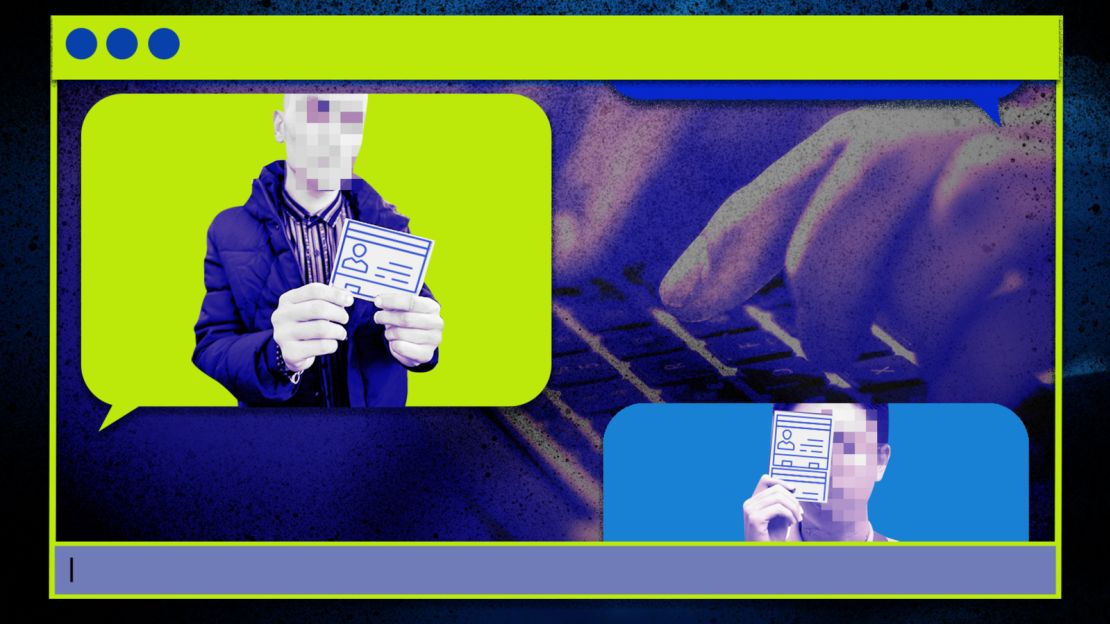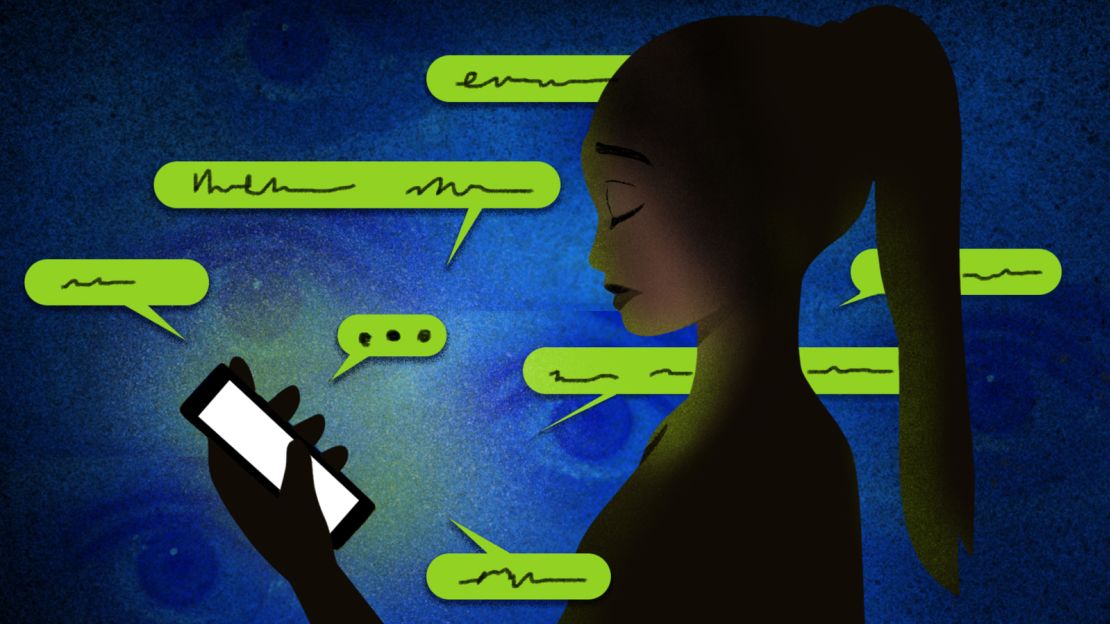Between the ages of 11 and 14, South Korean teenager Ji-o was threatened, stalked and pressured into taking sexually explicit photos of herself by men on the internet.
She joined Twitter in 2015 as a lonely 11-year-old elementary student, hoping to make friends, according to Choi Yunu, from non-governmental organization Mental Health Korea. As she interacted with people on the platform, she read about a way to make pocket money. People online would send her vouchers for snacks, and all she had to do was share pictures of her breasts.
But the exchange was a trick – ultimately, those uploads were used to blackmail her into accepting an exploitative pattern of abuse. One man claiming to be a 36-year-old father threatened to tell Ji-o’s parents what she was doing if she didn’t take explicit pictures for him. Another man set up a rule that she needed to respond to his messages within two minutes or he would send men to beat her up, although it’s unclear whether he knew where she lived and if so, how he had that information. Terrified of missing a notification, she slept with earphones in so that she would be woken by the buzz of an incoming message.
As a young girl, she lacked the maturity to rationalize what was happening to her. South Korea’s culture of victim blaming – even for people as young and vulnerable as Ji-o – prevented her from seeking help.
Now 16, Ji-o – not her real name – is still dealing with the aftermath of the three-plus years she spent subjected to online abuse and threats. She says she switched her phone number eight times and moved away from her parents’ home in rural South Korea to the capital Seoul, where she lives with her sister. She wants to change her name.
While digital sex crimes are a problem all over the world, they are a particular issue in South Korea, which has one of the world’s highest rates of smartphone ownership. Inadequate laws, weak sentencing, and poor policing mean that such crimes are rarely treated seriously by the justice system – and as a result, activists say victims feel discouraged from coming forward.
Last year, however, a digital sex crime case that bore some chilling similarities to Ji-o’s situation appears to have sparked change. After an outpouring of disgust over the case, some laws have been tightened and, in November, the ringleader was handed an unusually long sentence.
But advocates say much more needs to be done to take the issue of digital sex crime seriously – and keep young girls and women safe from dangers on the other side of the screen.
Inside the chat rooms
The case that prompted the recent changes in South Korea’s laws involved a university graduate on bed rest.
As he recovered from an operation to make his limbs longer, then-23-year-old Cho Joo-bin began trying to make money on the internet. He styled himself as a businessman in his 40s who had served prison time and had an amputated foot, and gave himself a nickname: Guru.
In September 2019, he founded a group chat called Guru’s Room on the encrypted platform Telegram, where messages can be set to disappear after they have been read. That room would become the setting for the most notorious digital sex crime case in South Korea, where men spent thousands of dollars to witness – and demand – the abuse of young girls and women.

Cho and his collaborators had a simple playbook for recruiting victims online. They offered them jobs as part-time models, then solicited compromising photographs from them, before coercing them into making degrading material by threatening to release their personal information and images to other internet users. Cho told them to raise their pinky finger in pictures which he later admitted was a way of branding the content. Authorities say there were more than 100 victims, including 26 girls in their teens.
“Foolishly, I was confident I wouldn’t be caught and I intended to make my own brand with my sexual content,” Cho said in September at one of his collaborator’s trials.
At the same time, he and his collaborators recruited members, offering teaser videos of sexually explicit content to try to lure them into paying for entry into one of the exclusive rooms where they had access to women and girls – referred to by Cho as “slaves” – who they could instruct to create sexually explicit material. These rooms were illegal – South Korean law forbids producing any sexually explicit material.
He attracted thousands of members, some of them paid. One group member – who is known only as Lee – sent his personal information and 3.6 million won ($3,300) to Cho as an entrance fee to get into the chat rooms, he testified in court, according to South Korean non-governmental organization Tacteen Naeil. That seems to have been on the higher end for entry – police said last year that buyers normally spent about $1,200 to enter a room paying with bitcoin.

Lee also paid into a “slave funding account,” which he believed was going to the victims as payment, but which he later found out went to Cho.
Another member, who paid Cho more than 1 million won (about $920) and verified himself by taking a selfie holding his social security ID card, said that Cho often deleted and created new rooms. Entry fees to the different rooms were higher for those with victims considered to be better looking.
As paid users became involved in the criminal rooms, the information they had given at the start became incriminating. When Cho contacted Lee saying he was low on cash, Lee gave him 650,000 won ($600) as he was afraid Cho might contact his wife. The other member – who cannot be named for legal reasons – said he remained a member as he was afraid of being threatened by Cho.
In 2019, two university journalism students alerted authorities to his illegal enterprise after joining the groups undercover using nicknames. In March 2020, authorities busted the network of chatrooms.
Dozens were arrested over their involvement in the Telegram ring. One alleged collaborator was only 16 years old. “He has been good with computers since he was in elementary school,” his lawyer said in court. “Because of the lack of parents’ protection or supervision, he consequently reached a trash island named ‘Guru’s Room’ in the vast sea of the internet.”
‘You’re not a human’
Guru’s Room was hardly the only place on the South Korean internet where women and girls were victims of digital sex crimes.
Cho had been inspired by other Telegram groups, including one named Nth room, run by someone who called himself GodGod. The journalism students, who asked to use the pseudonyms Kwon and Ahn to protect their safety, said there were many operators running similar chats on Telegram – and links to the groups could be found from a simple keyword search on Google.

A Telegram spokesperson told CNN that publicly available content which violates their terms of conditions is taken down. Already this month, more than 7,000 groups and channels related to child abuse have been banned, according to Telegram’s Stop Child Abuse channel.
“Sexual violence and the abuse of minors are not welcome on our platform,” Telegram’s spokesperson said in a statement.
According to police, more than 2,500 people were detained last year for digital sex crimes in South Korea. Of those, 220 were arrested for alleged sex crimes on Telegram, Discord and so-called darknet sites which cannot be accessed by a regular browser.
The Telegram rooms were among the most egregious examples of South Korea’s sex crimes, and were difficult to track given the app’s encryption. But Ji-o’s case shows young girls are also vulnerable on widely used social media platforms.
Years before Guru’s Room or Nth Room were even set up, Ji-o found herself trapped by her own personal information. When she refused to take degrading pictures for the man claiming to be a 36-year-old father, he spread her private details around the internet which others formatted into a graphic, a process known online as “taxidermy” because the victim’s information is preserved forever. She still doesn’t know how he got her personal details.
After that, huge numbers of people contacted her. Some told her to take off all her clothes, others told her to take photos of herself in school uniform.
“Did you do everything I told you to do?” one man wrote to Ji-o, in direct messages on Twitter seen by CNN.
“Remember: You’re not a human, but my toy.”
Even as the demands from strangers grew online, Ji-o was afraid to tell anyone. She was scared that telling the police would land her in a juvenile protection facility – under South Korean law at the time, minors seen as voluntary participants to digital sex crimes faced the prospect of mandatory attendance at such a center. And she was scared to tell her parents, worrying that they wouldn’t understand.
In 2018, police asked to speak to her. They had begun investigating a man she had been talking to online, and found her conversation with him while inspecting his phone. They told her that what she had been doing was not good, and that she could end up in a juvenile facility for posting videos and pictures of herself as they violated child and youth protection laws.
Then, because she was underage, they called her parents. Her dad asked why she posted pictures of herself online when she already had everything she needed and hit her, she alleges. Her mother cried and fell silent. They have never talked with Ji-o about the digital sex crimes again.
“It was hell, I blamed myself a lot and I still do,” she said, according to Mental Health Korea’s Choi. “Most of all, I am disappointed in my parents.”
A self-perpetuating problem
The Telegram victims didn’t alert police to what was happening. Nor did Ji-o.
In countries all over the world, stigma and the difficulty of going through the justice system prevent victims of digital sex crimes from talking to police. But in South Korea, the barriers are particularly pronounced.
Until the laws changed in 2020, South Korea assumed that some minors were willing participants in crimes perpetrated against them. Minors aged between 13 and 16 who were victims of sexual abuse or rape were viewed legally as consenting parties if they got some kind of benefit – such as money – from the perpetrator. These victims could also be sent to juvenile centers for education and protection.
Activist groups said the threat of these education centers seemed like punishment and deterred victims from telling police. The rules also meant that rapists didn’t necessarily get punished. In a well-known case in 2014, a 13-year-old girl with a mental disability who left home after breaking her mother’s mobile phone screen – as she was worried her mom would be upset – was raped by six adults who took her into their care and gave her food. A court decided she had voluntarily prostituted herself to receive food and accommodation.
Even if victims told police, crimes were often not investigated. In the past, police found it “almost impossible” to investigate digital sex crimes as they don’t have powers to adopt undercover investigation methods online, said Korean National Police Agency’s commissioner general Kim Chang-yong. He wants to see police given new powers to investigate online and more importantly, to be able to stop crimes before abuse begins.

And even when cases were investigated, few resulted in a lengthy sentence. Between 2011 and 2015, only 5% of people indicted in South Korea for filming, distributing and selling porn were sent to prison, according to a 2018 paper by Korean Women’s Development Institute, a government think tank.
Although producers of child exploitation images can receive a possible life sentence, the average sentence for people convicted of producing and distributing sexually exploitative material of minors was 2.6 years in 2018, according to the Korea Institute of Criminology. The United States also has high penalties for similar crimes, but unlike South Korea, these punishments are actually enforced – the average sentence for distributing child exploitation images was 11 years and 8 months, according to a 2019 report into US federal sex offenses.
The various problems with South Korea’s system all fed into one another, reinforcing the idea that digital sex crimes were not that serious and were not worth reporting, activists argued. Kim admitted police might not have seemed aggressive enough, but said few digital sex offenders were indicted – and even fewer received jail terms. “That discouraged police from investigating,” he said.
Despite that, research suggests such crimes may be widespread. According to a survey by Tacteen Naeil, 12% of middle school students and 4% of elementary school students have experienced a sexual approach online.
When the Guru’s Room case was revealed, to many it felt like the last straw. It followed other high-profile crimes that had received weak penalties, including the South Korean mastermind behind the darknet’s largest-known site of child exploitation videos, who was sentenced to 18 months in jail in 2019 for producing and distributing child pornography – a charge that carries a possible 10-year jail term. South Korean authorities refused to extradite him to the US where he faced several charges, including advertising child pornography, which carries a possible 30-year sentence.
An online petition demanding a heavy punishment for Cho attracted more than than 2 million signatures, well over the 200,000 needed to prompt an official response. The justice system needed to take action.
Signs of change
On a cold day in November last year, after a monthslong trial, Cho Joo-bin was sentenced to 40 years in prison for producing and distributing illegal sexual visual material, forced sexual abuse, rape, sexual harassment, blackmail, recording sexually abusive behaviors, coercion, violation of private information protection, and fraud.
It was a stark contrast from the weak penalties digital sex offenders typically receive. After the sentencing, a dozen women gathered outside Seoul’s Central District Court, holding a deep red banner that read: “This is just the beginning.”

In the months leading up to the sentence, parliament overturned the law making minors subject to education after being the victim of a sex crime, meaning all children are now considered victims. South Korea raised the age of consent from 13 to 16, meaning any adults who have sex with anyone under 16 could be liable for charges of child sexual abuse or rape. In December, shortly after Cho’s sentencing, Korea’s top court finalized new sentencing guidelines, aimed at making the penalties for sexual crimes stronger.
Lawyer Cho Eun-ho, no relation of Cho Joo-bin, said the stronger punishments made people more aware of digital sex crimes and their seriousness – and had only been implemented thanks to the victims who survived violence and reported crimes.
But many worry that even with those new measures, South Korea’s handling of digital sex crimes still falls short.
Even with the new sentencing guidelines, penalties are below other international jurisdictions. The new base penalty for producing child sexual exploitation images is five years, still lower than in the US where there is a minimum of 15 years in prison under federal law. There are also legal gaps. Some countries – including the United Kingdom – have laws punishing online sexual grooming. South Korea does not have such a law.
And some are concerned that, when cases are not as high profile as the Telegram case, penalties may not be as severe. There also remains a lack of understanding about digital sex crimes within the justice and policing system.
Attorney Baek So-yoon analyzed more than 200 rulings from November 2018 to July 2020, where people had been found guilty of distributing sexual exploitation videos of children and juveniles. She found that judges tended to have little understanding of digital sex crimes and often did not comprehend the scale and impact of the crimes on victims. That meant perpetrators were given a lighter sentence.
And Choi Yunu, from Mental Health Korea, said victims remain afraid that, if they report crimes to police, their parents will find out. Police also need to be careful to avoid adding to the victim’s trauma, he said.
“Please think of them as their own children, and understand how they’re fighting on the battlefield, being chased by an invisible enemy,” Choi said.
‘There is no end to it’
The prosecution of others involved in the Guru’s Room is still going through the courts. One key player is due to be sentenced in late January.
But even once the court processes are done, victims fear the crimes are never truly over.
In the trial of another of Cho’s collaborators, who cannot be named for legal reasons, the prosecutor said victims are struggling to recover from the trauma. Videos showing the abuse perpetrated against them have been spread throughout the internet.
“I’m so busy deleting videos distributed by Cho Joo-bin that my daily scars seem to be endless,” said one victim through her lawyer Oh Sun-hee.
Shin Jin-hee, a lawyer representing 30 victims in the Telegram case, said they could not continue with their normal lives.
“As a lawyer, after the sentencing the case is over – but the case isn’t over for the victims,” she said. “(They) continue to live their lives worrying if other people who saw or downloaded their materials would spread the videos or pictures.
“Some victims want to change their social security number or their names but many underaged victims have to get their parents involved in. Of course it’s not easy for adults either. How do you explain to your friends or colleagues when you change your name?”
For Ji-o, the crimes ended in 2018, but in a lot of ways, her story isn’t over. She has never made an official complaint to police about what happened to her. She remains afraid of the repercussions she could face if she tells them. That means no one has ever been held to account for what happened – and her images and private information are still on the internet.
“(My information) is still out there, somewhere. Somebody might be watching. It could be in a year’s time that it reappears again – there is no end to it,” she said.
Julia Hollingsworth wrote from Hong Kong, Yoonjung Seo reported from Seoul. Illustrations by Leanza Abucayan.


